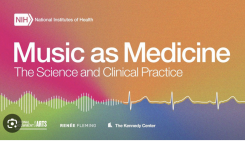Beethoven’s genes reveal low predisposition for beat synchronization
Craig Boerner
https://news.vumc.org/2024/03/26/beethovens-genes-reveal-low-predisposition-for-beat-synchronization/
Ludwig van Beethoven, one of the most celebrated musicians in human history, has a rather low genetic predisposition for beat synchronization, according to a Current Biology study co-authored by Vanderbilt University Medical Center (VUMC) and the Max Planck Institutes for Empirical Aesthetics in Frankfurt am Main, Germany, and for Psycholinguistics in Nijmegen, the Netherlands.
Music as Medicine: December NIH Workshop Featured Ongoing Work of Our Lab
Kelly Corcoran, MPH
https://mailchi.mp/vumc/musichealthjanuary2024
The work of the Vanderbilt Music Cognition Lab was featured many times during the "Music as Medicine" workshop, sponsored by the National Institutes of Health (NIH) and the National Endowment for the Arts (NEA) and jointly organized by NIH, the NEA, the Renée Fleming Foundation, and the John F. Kennedy Center for the Performing Arts, which took place December 14–15, 2023. The event aimed to highlight accomplishments from the last 6 years in advancing scientific research on music and health, develop a blueprint for the next phase of research, and further build the research community.
FAQ about Beat synchronization GWAS study
Reyna Gordon
https://www.vumc.org/music-cognition-lab/FAQbeatGWAS
This page is an FAQ about Niarchou, Gustavson et al., 2022, Nature Human Behaviour. Genome-wide association study of musical beat synchronization demonstrates high polygenicity.
Access the full paper at https://doi.org/10.1038/s41562-022-01359-x

